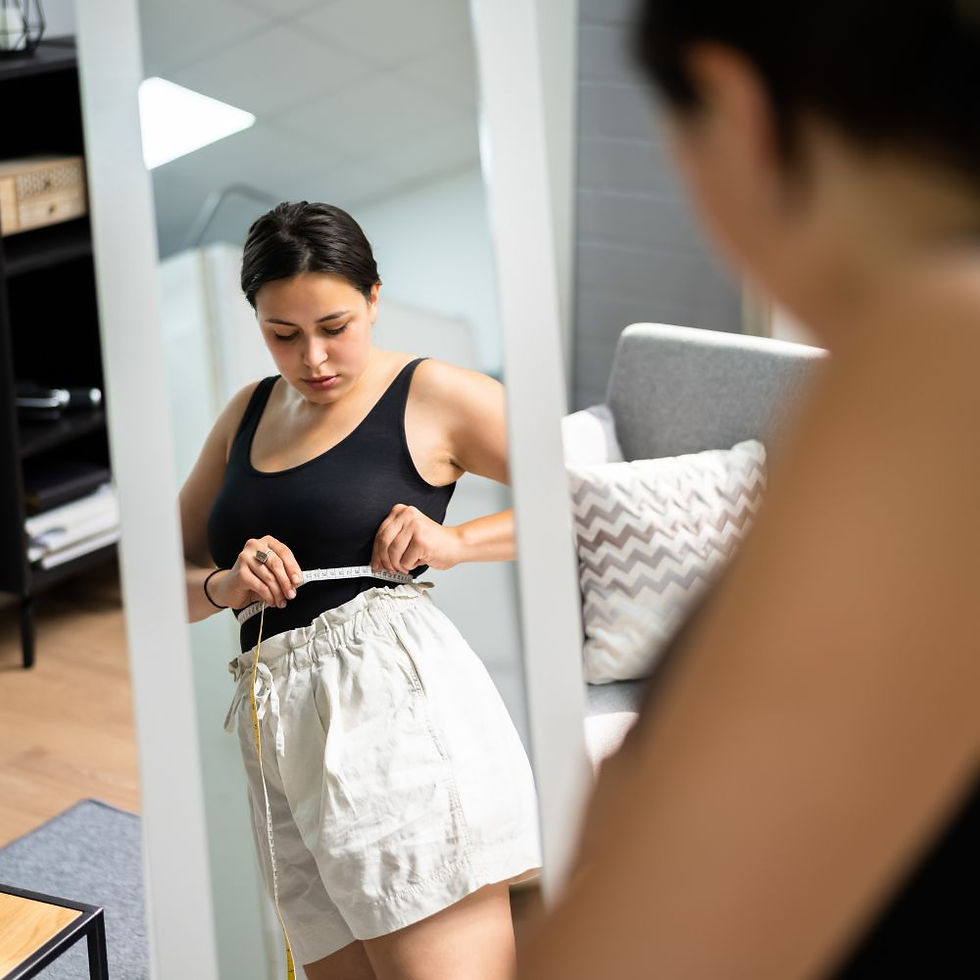.jpg)
Reclaiming Your Reflection
So, how do you stay grounded in a body that keeps changing?
Start by checking in with yourself, not just the scale or the mirror.
How do you feel when you move?
What feels strong, comfortable, capable?
What clothes make you feel most like you, not just “smaller you”?
What makes you feel proud, beyond the numbers?
This is your moment to rebuild the relationship with your body on your terms. Not how others perceive you. Not how social media wants you to look. Not how the old you would have judged.
You get to decide how you show up in this new skin, and how much of that you choose to share.
The Bottom Line: You Don’t Owe Anyone a Before-and-After
Your body is not a conversation starter. It’s not a debate. It’s not a public service announcement. It’s yours.
You can lose weight and still feel unsure, vulnerable, or not quite yourself. You can get compliments and still feel unseen. You can change your body and still be working on how you see yourself.
That doesn’t make you ungrateful. That makes you human.
So protect your peace. Speak kindly to your reflection. Hold your boundaries, even when they’re uncomfortable.
And remember: you never have to justify your journey to anyone.
People Will Comment. You Don’t Have to Smile Through It.
Here’s the other thing no one prepares you for: Once your body starts changing, people will feel weirdly entitled to talk about it. A lot.
They’ll say things like:
“You look amazing, what’s your secret?”
“How much weight have you lost?”
“You’re so skinny now!”
And eventually... “Don’t lose too much!”
And sometimes, like in many real-life examples from social gatherings or dinner parties, it escalates fast. One guest, a stranger, leads with a loud, “You look so skinny!” Then, before any boundary can be set, comes the barrage:
“How did you get that skinny?”, “You’re not still losing weight, are you?”, “People die on that medication.”, “You’ve lost enough now,” and “When are you stopping?”
All this. In front of a room full of people, and all because your body changed.
Let’s be clear: You don’t owe anyone an explanation. Not for how you lost weight. Not for why you’re on medication. Not for your goals, your progress, or your plans.
What’s happening to your body is personal. That doesn’t change just because it’s visible.
Compliments Can Be Complicated
Even the “nice” comments can sting.
“You look amazing!” can quietly imply you didn’t before. “You’re so slim now!” can make you feel like you have to stay that way to keep being worthy of praise.
It’s okay if compliments feel weird. It’s okay if they make you want to hide instead of shine. You’re allowed to say “thank you” and still feel conflicted. You’re allowed to not want to talk about it at all.
You’re navigating something complex, a physical transformation and an emotional one. Be kind to yourself as both unfold.
Your body is changing. That doesn’t mean everyone gets a say.
Weight loss can feel like a quiet identity crisis.
You look in the mirror and see someone you don’t quite recognise. People start commenting on your body like it’s public property. And somewhere in the middle of it all, you’re meant to smile politely, say thank you, and keep shrinking.
But here’s the part no one warns you about: Body image doesn’t automatically “fix” just because the weight comes off. In fact, for many people on GLP-1s, it gets more confusing before it gets clearer.
Let’s talk about why.
When Your Body Changes Faster Than Your Brain Can Catch Up
Rapid weight loss, like what often happens on Ozempic or Mounjaro, can leave your mind lagging behind your reflection.
One day you’re tugging at clothes that used to cling, the next you’re staring at your new silhouette like a stranger just moved into your body. It can feel exciting, yes, but also surreal, destabilising, and weirdly lonely.
And this disconnect? It’s more common than you think.
Some people even experience symptoms of body dysmorphia, a recognised mental health condition where you fixate on flaws in your appearance that others don’t see. It’s important to name the experience:
“I’ve changed… but I still don’t feel like I look ‘right.’”
That feeling deserves compassion. Because it’s not just about losing weight, it’s about re-learning how to see yourself. And that takes more than just a smaller dress size.
For more information on body dysmorphia and how to get support, visit nhs.uk/mental-health/conditions/body-dysmorphia.
Bite-Sized Podcasts
Listen to this article as audio

Published:
18 Jul 2025
Updated:
6 Oct 2025
“You Look So Skinny!” What No One Tells You About Body Image on GLP-1s
Tuning In
.jpg)
Helpful Companions For Your Weight Loss Journey
From meal ideas to daily tracking, these digital tools are designed to make life on GLP-1s a little easier.

.png)






.jpg)

.jpg)
.jpg)